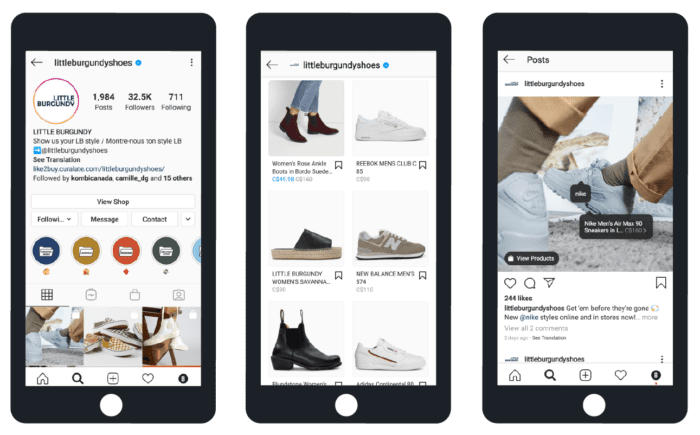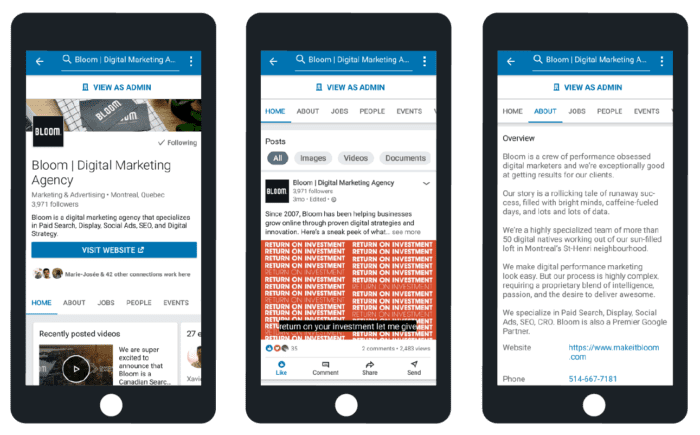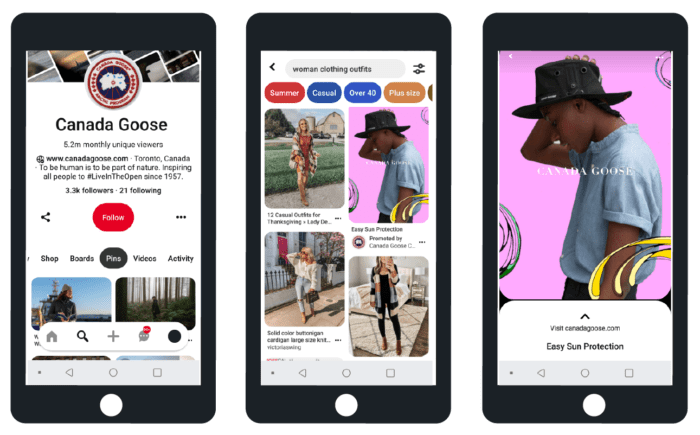Every business needs a presence on social media. Not only is social media one of the cheapest ways to reach a wider audience, but it can help legitimize your business, too.
But… all social media platforms are not made equal.
Whether you’re considering going the organic route or using paid traffic, your success will heavily depend on choosing the right social media platform for YOUR business.
Before making your choice, consider both the organic and paid aspects of your potential platform. Each has its own pros and cons, and the best platform for organic won’t necessarily help you succeed with paid media – and vice versa.
Organic Versus Paid Social Media Advertising
So what type of marketing should you try out on social media?
Organic content is all types of content you post on social media platforms for free.
These posts show up on the feeds of your followers, and although each platform has its own algorithm and rules, you can expect more people to see your posts when they get a higher engagement level.
Having a frequent and consistent organic social media presence will create some traction. But, consistency is key here. Frequent posting for one month, and going radio-silent the next month won’t help your growth.
On the other hand, advertising through social media using paid content will only show your posts to the audience you decide to target. The amount of impressions your content gets depends on how much budget you invest.
But paid content doesn’t just show up in feeds – you can also place your content in banners, inside direct messages, stories, marketplaces, and more depending on the platform of your choice.
Apart from offering you wider access to an audience, paid content is much more targeted than organic. You are in control of exactly who sees your ads.
You can target demographics, interests, behaviors, location, and more. Additionally, you can retarget people who visited your site previously – or people who have similar interests to an existing audience.
Types of Social Media Platforms for Advertising
Although there are many more social media platforms available, these are some of your best choices when it comes to business.
Facebook still remains the world’s largest social media site, with 2.6 billion active users in 2020. Because of all the information available about its users, it’s perfect for paid advertising.
The amount of detailed targeting you can achieve on Facebook can help you direct your paid content to exactly the people you want.
Due to the increase of ads, it is now extremely difficult to get a good organic reach with your Facebook posts. Additionally, changes in the algorithm have made organic reach dip even lower. Learn more about algorithm changes, Facebook Ads and Boosted posts in this article: Read This Before Boosting A Post on Facebook.

Instagram is owned by Facebook, so if you create paid advertising on Facebook, you can easily post similar ads without more work.
However, the gulf grows when it comes to organic content. Why? Over 200 million Instagram users visit at least one business profile daily, and 60% of users say they discover new products using Instagram.
Even though there are more users on Facebook, organic Instagram posts get 23% more engagement.
Unlike Facebook, Instagram is a visual platform, meaning that you cannot create a post without a video or image.
Instagram is also chock-full of business tools, such as shoppable posts, ‘swipe-up’ features on Stories, featured stories on your profile, and more. Here’s everything you need to know to sell your products on Instagram.

Linkedin isn’t just a glorified resume platform. If you operate in the B2B space or target individuals based on their professional positions, it could be your perfect platform.
The types of paid content you can create on Linkedin is similar to Facebook, but be aware that Linkedin tools aren’t as advanced. However, it does give you access to more accurate job positions than Facebook. We also suggest that every B2B company set up LinkedIn Insight Tag, even if they don’t advertise on LinkedIn.
For organic content, Linkedin has its own blogging platform in addition to regular feed posts. Keep in mind that due to Linkedin’s more professional nature, the educational value and quality of what you post has an important impact on your success.
YouTube
Unlike other social media platforms, Youtube acts more like a search engine (like Google!). This means that creating organic video content on Youtube can not only help you rank on YouTube, but on Google, too!
Ever noticed that search results on Google often display videos at the top? When you create high-quality Youtube content and optimize it for SEO, that content can show up for search results, whether people search on Google or Youtube.
This means anyone can potentially see your video, whether they have a Youtube profile or not.
For paid traffic, you can run ads on other people’s videos, or create banner ads that will appear below videos. You can target people based on their Google search history and Youtube viewing behaviors.
Snapchat
Snapchat is a visual platform like Instagram, but it is unique due to the ephemeral nature of the posts. Like Facebook and Instagram, it utilizes stories that remain available for 24 hours, but users can also send posts that disappear after being viewed once.
You can create organic Stories, or pay to show up on the Discovery section and link users outside of the platform.
Keep in mind that Snapchat’s user base is relatively young. Of its 229 million daily users, 90% are between the ages of 13 and 24.

Like Youtube, Pinterest acts more like a search engine than a social media platform. Users can create visual pins that link outside of the website. These pins can be found by searching for keywords.
Its users are mostly made up of women (72%), and high-income families are more likely to use the platform than lower-income households.
While organic content can be effective to increase traffic to your blog or business website, Pinterest can also be used to create paid content, with the advantage of allowing you to target both for keywords and targeted audiences!
TikTok
Tiktok is relatively new compared to other social media platforms, but it is growing quickly, with 800 million active users worldwide. Like Youtube, TikTok is video only, but it’s meant to create shorter 15-second clips with the help of lip-synching tools, filters, and more.
Paid content is relatively new and not as established as other platforms. However, brands can use TikTok to create organic content that is more raw and unedited than what you would find on Youtube. Want to learn more about TikTok? Check out our marketing guide about TikTok.
Like Snapchat, Tiktok’s audience is younger. 50% of its audience is under 34, and 26% of them are between 18 and 24.
How to Choose The Right Social Media Platforms For Your Business
Now that you know a bit more about your options, it’s time to choose your social media platform and establish your marketing strategy!
However, you should first establish your goals and choose your platform based on those goals, instead of trying to fit the mold of whichever platform you think is best for superficial reasons.
Define Your Social Media Goals
Why do you want to advertise on social media?
Of course, ‘growing your business’ is typically desirable, but be more specific. Do you want to:
- Increase sales?
- Grow brand awareness?
- Generate leads/email subscribers?
- Increase traffic to your website?
Your goals are crucial because not every platform will help you achieve these goals. For instance, if you want to increase traffic, Pinterest would be much better than Instagram, since every pin links to an outside website. Plus, Instagram doesn’t allow links on their posts.
But to increase sales, Instagram can work better than Pinterest, since you can create Shoppable posts and engage and nurture followers.
Define Your Target Audience
Who is your audience, and what actions do you want them to take?
Each platform has a different user base. Want to target Gen Z? Snapchat and Tiktok are your best bet.
Meanwhile, don’t expect to succeed on those two platforms if you want to target baby boomers or Gen X.
Similarly, if you’re B2B, you may see better success on Linkedin compared to Facebook.
Keep in mind that not all social media platforms have the same reach worldwide. Your chosen platform will vary depending on if you are targeting local or global audiences.
Become Familiar With the Social Media Presence of Your Industry and Your Competitors
Make a list of your competitors if you haven’t already. What are these brands doing on social media?
Don’t just check which platforms they’re on. Take note of their actions, whether they are using organic content, paid content, or both.
For example, to see your competitors’ ads on Facebook, take a look at the “Page Transparency” section. You will their ad librabry. LinkedIn also offers this option on a company page.
You can also track:
- Types of content they post
- Frequency of posts
- Engagement levels they are getting compared to their following
- How they optimized their profiles
Match Your Goals and Audience with The Options and Benefits of Each Social Media Platform
With your goals, audience, and market research in hand, you can now compare your data with the pros and cons of each platform.
You can choose to create organic content on one platform while utilizing paid content on another. You don’t have to do everything on the same platform!
For instance, you can use Pinterest to drive organic traffic while retargeting that traffic using Facebook and Instagram ads to increase sales.
Choose the social media strategy that will help you achieve your goals!* Next step? Create a social media calendar and start posting!
*By the way, try to do this exercise once in a while. Social media changes quickly, it’s important to stay up to date and relevant!
Need More Guidance? We Are Experts in Social Media Advertising and Community Management. Get A Proposal Today!
Read it first:
Get new articles delivered to your inbox




Share this: